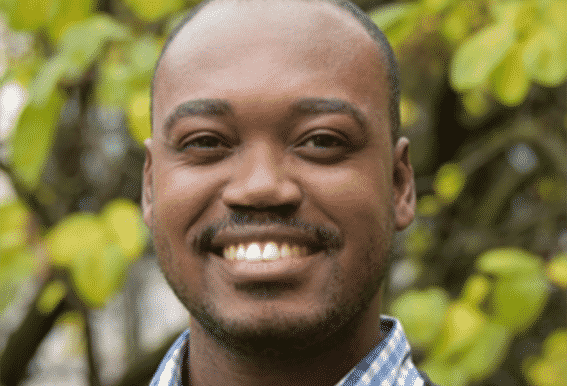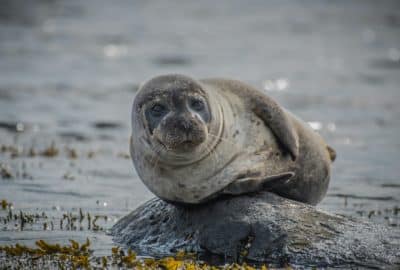Could chocolate go extinct?
Wednesday 20th Oct 2021, 12.30pm
Chocolate. It’s rare to find anyone who isn’t partial to a square or two of this delicious treat. But is its very existence in danger? (*Cue worried faces.*) In this episode of the Big Questions Podcast we chat to chocoholic and researcher Acheampong Atta-Boateng, who studies the relationship between cocoa trees and their micro-pollinators. We hear about how monocropping, pesticides and climate change all pose a risk to the cocoa tree and ask – could chocolate go extinct?
Emily Elias: Chocolate. It’s ingrained in us to be that cheeky treat, that pick-me-up to get us through our tough days. A reward for doing something good or just something you stuff in your face when no one is looking. But what would happen if it disappeared? The world is changing. And what if chocolate becomes an article in a history book? On this episode of the Oxford Sparks Big Questions Podcast, we are asking, could chocolate go extinct?
Hello, I’m Emily Elias, and this is the show where we seek out the brightest minds at the University of Oxford and we ask them the big questions. For this one, we found a researcher who is part researcher, part chocoholic.
Acheampong (Aché) Atta-Boateng: My name is Acheampong Atta-Boateng, and I’m a final year doctoral student at the School of Geography and the Environment, University of Oxford. I study cacao and pollinators of cacao, so, basically, chocolate trees.
Emily: So we’re going to ask a really big question today about whether chocolate could become extinct. But before we get there, can we just start with the very basics? Where does chocolate come from?
Aché: So chocolate is made from cocoa, and we make cocoa from the seeds of the cacao tree. Now, we can call it the chocolate tree. The cocoa tree has been a delicacy for a long time. In fact, there is evidence that cocoa has been consumed by humans for thousands of years. Before its global popularity, cocoa was enjoyed exclusively as a high-valued fruit or drink among Asian cultures in Southern America. The beans were so valuable they were used as currency for trading.
Now, cocoa, or chocolate trees, they love shady, humid places and are cultivated by millions of smallholder farmers in tropical places like Ghana. They need pollinators to make the lovely chocolate fruits from tiny flowers. But insects like bees are too big, so they rely on small insects, especially midges to help pollinate the flowers.
Emily: I had no idea that bees were too big for chocolate trees. Okay, so I imagine you’ve just got these, like, tiny little flies and mosquitoes and midges, they’re good for the trees, they’re running around, but they are probably not so great for humans.
Aché: Yes, you’re right. As you know, mosquitoes kill more people in Africa than HIV and midges carry diseases like dengue fever, malaria, Zika virus and others. Pesticides are normally used by farmers to control pests, but then you will be killing the pollinators as well. So there’s been a push for farm practises that can impact midge populations, for instance, monocropping.
Emily: What’s monocropping?
Aché: Monocropping is the agricultural practise of growing a single crop year after year on the same land in the absence of rotation through other crops or growing multiple crops on the same land.
Emily: What’s the benefit of running your farm using monocropping?
Aché: Well, if you’re running a big industrial farm, the perks are simple. You just focus on one thing. You get higher yields, it’s easily mechanised. So it has a standardised planting, maintenance and harvesting process, it therefore results in higher yields and lower economic costs in the short term. On paper, it sounds good for farmers who are always struggling for financial security.
Emily: I’m sensing a really big ‘but’ here.
Aché: Yes. So first of all, monocropping reduces the economic lifespan of trees and long term financial security for farmers. So instead of, say, 60 years of continued harvest, you could be looking at 25 years or less. Monocropping also depletes soil rapidly. Unlike most forest trees, cacao is poor in nutrient cycling, so it all goes in to make the delicious chocolate, I guess. So you will need lots of fertiliser at cost, or farmers will need to convert more forests into farms.
Deforestation, for instance, also impacts climate change. And you can see more harmful pesticides, herbicides or chemicals, especially greenhouse emissions from high fertiliser inputs in the soil. Monocropping also requires a lot of water and energy to maintain the farm, and it hurts biodiversity in the area because you are only growing one thing.
Emily: I take it you are not a big fan of monocropping.
Aché: Laughter) No.
Emily: What would you rather see farmers doing, then, instead of using this one technique?
Aché: Well, I want farmers to practise what we call agroforestry or agroecology. Here you are practising agriculture, but then you’re also trying to maintain and enhance existing plants and animal interactions so that you have a more complex ecosystem, which is a good thing.
Emily: Of course, you would say that. But specifically, when you’re talking about these midges and these mosquitoes and these cocoa trees, I mean, how is using this type of farming better?
Aché: So I’ll give you an example. So, for instance, if you have agroforestry, where you intercrop cocoa with shade trees, maybe legume trees or other economic fruits, or, for instance, even timber trees, that can really benefit the health of the farm and provide even an extra income source for farmers while they are waiting for the cocoa harvest. The additional trees support nutrient cycling, for instance, and provide multiple habitats that can increase pollinator diversity.
Also, wild midges play a double standard as cacao pollinators and also disease carriers, they actually also serve as food for other key organisms who altogether form a complex food web which maintains biodiversity richness and provides incredible ecosystem services. So all this means that we can actually keep the right balance of midges pollinating trees, midges getting eaten by predators, kind of the circle of life stuff.
Emily: I guess it always comes down to being about the circle of life, doesn’t it?
Aché: Absolutely. (Laughter)
Emily: Okay. So assuming we’ve got our farmers working in this non-monocropping, super sustainable way, we’ve kind of got this big thing called climate change looming. So how is climate change going to affect chocolate farmers?
Aché: Well, there is the rising global temperature, which could really hurt global production of chocolate. So let’s look at Ghana, for instance, we’ve got low-income smallholder farmers, and they are the backbone of the country. So a question is, will they have to move their farms to higher elevations because it’s cooler, or maybe build a massive greenhouse on their land? That’s really expensive. And we don’t usually put tree crops in greenhouses, so it’s going to be a lot of trial and error, which is even more expensive.
Also, insects are cheap and efficient pollinators rather than the labour-intensive hand pollination that will be required in a greenhouse. So cost will be passed on to the consumers, which could mean the end of affordable chocolate.
Emily: Could we really see something like that in the future where farmers are just chasing down the right temperature and conditions in order to grow their crops?
Aché: That is a possibility. But we have to also remember that most of the farmers, the millions of farmers who predominantly produce cocoa, are smallholder farmers and they do not have the tools or the investment capacity to actually be chasing all this stuff. Part of the problem is when the conditions are not viable and they have to tend to places like forests, then you will see forest conversion into farmlands and that is really not good for climate change, again because we are deforesting the land.
Emily: Yes, it doesn’t really sound like much of an option like, “Oh, my family farm has been on this land for 100 years and I’m just going to go find new land.” It doesn’t really work like that.
Aché: Yes, and actually there is also a problem with land tenure, and I think you hit it right on the spot. You just can’t move to another land because most lands are family-owned, [ ___ 0:09:16] lands. One of the big problems in most of the growing areas is that land is shared by the grower and then the land owner. So already there is a very complicated process of land ownership, let alone having to start the whole process again by acquiring new land. And so it’s not easy to actually access land to begin with.
The second problem is that if you have to start all over again, it takes about six years or so for the tree to mature and start producing fruit. And since these are already low-income, smallholder farmers, they need to actually support their families. And so abandoning the land and then having to start all afresh, growing new seedlings, waiting for it to become economically viable, what happens in between? So there are multiple problems that I can see there.
Emily: So, getting back to our big question, could chocolate go extinct? Do you think that’s the case, or could it just become really, really, really, really, really expensive?
Aché: Chocolate could become a luxury item. Indeed, and the thing is, chocolate is also too big to fill. We love chocolate and so we are always going to want it. The question becomes, who can afford it?
Emily: Can I ask you a very personal question, what is your favourite chocolate bar?
Aché: I like 100% dark chocolate, if that is a criteria. No sugar, no milk, just the real stuff. I love the smell of cocoa.
Emily: This podcast was brought to you by Oxford Sparks from the University of Oxford with music by John Lyons and a special thanks to Acheampong Atta-Boateng. Tell us what you think about this podcast. You can go to Twitter, tweet us @OxfordSparks. Find us on Instagram. Find us on Facebook. Find us at our website oxfordsparks.ox.ac.uk. And if you’ve got a big question, we can do our best to get you a big answer. Get in touch. I’m Emily Elias. Bye for now.
Transcribed by UK Transcription.





